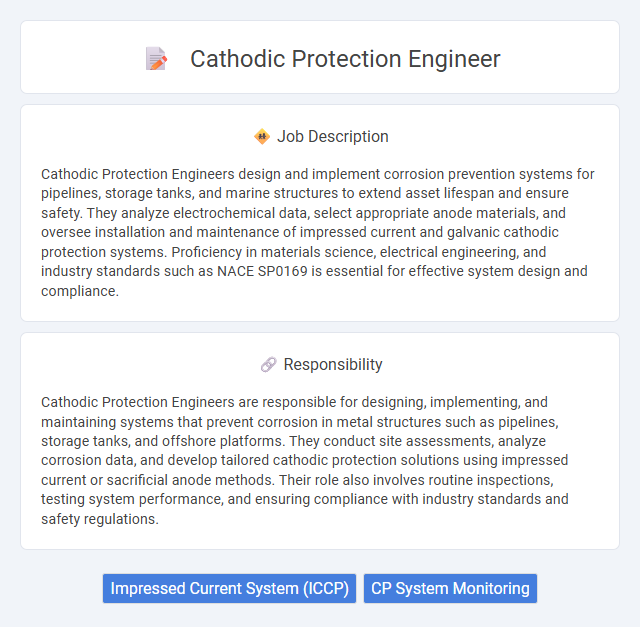
Cathodic Protection Engineers design and implement corrosion prevention systems for pipelines, storage tanks, and marine structures to extend asset lifespan and ensure safety. They analyze electrochemical data, select appropriate anode materials, and oversee installation and maintenance of impressed current and galvanic cathodic protection systems. Proficiency in materials science, electrical engineering, and industry standards such as NACE SP0169 is essential for effective system design and compliance.
Individuals with strong analytical skills and a solid understanding of corrosion processes are likely to be well-suited for a Cathodic Protection Engineer role. Those who are comfortable working in industrial environments and have a detail-oriented mindset may find this job aligned with their strengths. Candidates who prefer fieldwork and problem-solving in technical settings could have a higher probability of thriving in this position.
Qualification
A Cathodic Protection Engineer must possess a bachelor's degree in electrical, mechanical, or corrosion engineering, with specialized training in cathodic protection methods and corrosion control technologies. Proficiency in industry standards such as NACE International certifications (e.g., CP1, CP2) and experience with pipeline and infrastructure corrosion mitigation are essential. Strong skills in data analysis, inspection techniques, and knowledge of electrochemical principles ensure effective design and maintenance of cathodic protection systems.
Responsibility
Cathodic Protection Engineers are responsible for designing, implementing, and maintaining systems that prevent corrosion in metal structures such as pipelines, storage tanks, and offshore platforms. They conduct site assessments, analyze corrosion data, and develop tailored cathodic protection solutions using impressed current or sacrificial anode methods. Their role also involves routine inspections, testing system performance, and ensuring compliance with industry standards and safety regulations.
Benefit
Cathodic Protection Engineers likely gain significant professional benefits by ensuring the integrity and longevity of metal structures, reducing corrosion-related failures. This role probably offers opportunities to work with advanced technologies and materials, enhancing technical expertise and career growth. The job may also provide a competitive salary and demand in industries like oil and gas, maritime, and infrastructure, increasing job security.
Challenge
Cathodic Protection Engineer roles likely involve complex challenges related to preventing corrosion in infrastructure exposed to harsh environments. The position probably requires a deep understanding of electrochemical principles and the ability to design effective protection systems under variable field conditions. Engineers in this role might face difficulties in balancing cost, safety, and environmental impact while ensuring long-term asset integrity.
Career Advancement
Cathodic Protection Engineers specialize in preventing corrosion on metal structures, offering critical expertise in industries such as oil and gas, maritime, and infrastructure. Career advancement opportunities often include roles like Senior Engineer, Project Manager, or Corrosion Specialist, with pathways leading to technical leadership or consultancy positions. Gaining certifications such as NACE CP1 or CP4 and experience with advanced monitoring technologies significantly enhances professional growth prospects.
Key Terms
Impressed Current System (ICCP)
Cathodic Protection Engineers specializing in Impressed Current Cathodic Protection (ICCP) systems design, install, and maintain electrical systems to prevent corrosion on metal structures such as pipelines, tanks, and offshore platforms. ICCP systems use an external power source to apply a continuous protective current, effectively mitigating corrosion by shifting the electrochemical potential of the metal surface. Expertise in selecting appropriate anodes, power supplies, and monitoring equipment is essential to optimize system performance and ensure long-term structural integrity.
CP System Monitoring
Cathodic Protection Engineers specialize in CP system monitoring to prevent corrosion in metal structures such as pipelines, tanks, and offshore platforms. They utilize advanced techniques like potential mapping, data acquisition systems, and remote monitoring technologies to assess system performance and ensure optimal protection levels. Regular analysis and adjustment of impressed current or galvanic anode systems improve asset longevity and reduce maintenance costs.
 kuljobs.com
kuljobs.com